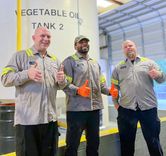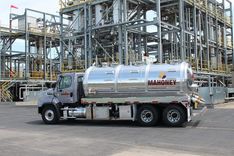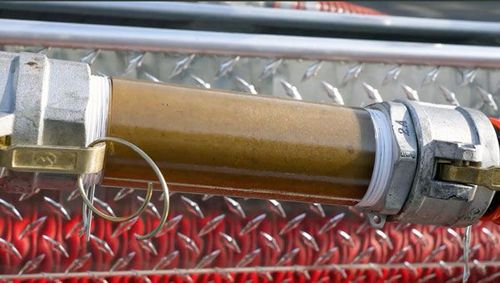Full Circle UCO





Used cooking oil is pumped from a collection tank. / PHOTO: MAHONEY ENVIRONMENTAL
December 20, 2023
BY Anna Simet
With a single truck in 1953, James Mahoney started up Mahoney Grease Service as a fats and oils recycler, using 13-gallon drums to service customers. Upward of seven decades later, the company has grown to service over 80,000 businesses, with 30 transfer stations and 19 recycling plants across the U.S. Over the past year, Mahoney has collected and processed about 400 million pounds (200,000 tons) of UCO. Though the company was acquired by renewable diesel and SAF producer Neste in 2020, it continues to operate as a standalone subsidiary.
President and CEO Dave Kimball says Mahoney has made 12 acquisitions in the past two years alone, jumping from roughly 240 to 700 employees. Kimball underscores how hard the company’s dedicated drivers work, often beginning 10- to 12-hour shifts between midnight and 3 a.m. to get the job done before restaurants open and to beat traffic. “Our drivers have tough jobs,” he tells Biodiesel Magazine. “They’re getting out of their truck 20 times a day and unloading UCO tanks.”
In a nutshell, exterior UCO tanks—sometimes heated with hot water tanks—are either lifted via chains and dumped, or cleaned out via a vacuum pump. Some restaurants have a port that extends from inside the business through an exterior wall, where drivers attach hoses to empty indoor tanks.
Drivers’ routes are planned by Mahoney’s logistics teams, and include weekly to annual pickups. “The driver will collect within, say, 150 miles of a transfer station that’s in the middle of the geography, and bring it all back to that tank,” he explains. “About once a week, the tank is loaded up and taken to one of the 19 plants where we clean it up, remove the solids and water, and let it settle.” Once pretreated, the processed UCO will be shipped to one of Neste’s refineries, either in Finland, the Netherlands, Singapore or California, where the company has a joint operating refinery with Marathon Petroleum. At these refineries, collected UCO is turned into products including renewable diesel or SAF.
Combatting Theft
As are most in the UCO business, Mahoney is all too familiar with UCO theft, which Kimball describes as rampant in the industry. “It’s up to 30%, which is a huge number,” he says. “We see it all the time. When I started two years ago, we had hotspots in the Northeast and Southeast, but now, we see it everywhere.”
Spikes in theft can be attributed to dramatic UCO price increases driven by the growing biofuel industry. While the U.S. EPA released UCO traceability requirements in 2020, Kimball is skeptical of its effectiveness on theft prevention. “I don’t know that these rules will help us much,” he says. “What they’re asking for is the point of origin—where the oil was collected and the volume—but they don’t ask for a copy of a contract or anything like that. So, if you’re stealing the oil, you can simply use the address where you got it, and nobody will know whether you had a contract or not.”
Advertisement
Advertisement
As for physically safeguarding against theft, Mahoney has implemented a number of measures, including supplying its customers with a UCO locker, an accessory included with their proprietary equipment, as well as devising a network of private detectives. “Whoever thought you would need that for grease?,” Kimball says. “The restaurants will let us know that it’s happening, or our drivers notify us of empty tanks, and these guys will put up cameras or do surveillance overnight. We have been really successful in the Northeast and New York area, catching these thieves.”
One issue that compounds the problem, Kimball says, is that oftentimes police don’t realize that grease theft is an issue. “They don’t know the value of it,” he explains. “Especially in the Northeast. And these aren’t smalltime criminals. There is a lot of work going into trying to stop this.”
Another initiative of Mahoney’s is the potential modification of their tanks to make them more theft proof, but this may not even be enough to deter some thieves. “Some carry cutting torches with them, some cut or break off our locks, and we’ve had whole tanks stolen, just like when individuals have taken whole ATM machines,” Kimball says.
Mahoney’s custom tanks, called Direct Connect, are placed inside of the restaurant and connected to a port that travels through the wall. This technology allows customers to transfer used cooking oil from their fryer to the tank by pushing a button, rather than manually transferring it. Direct Connect equipment can also be placed outside of the restaurant, so it doesn't take up interior space. “When trucks pull up, we connect the hose to the port and pump out the tank, so these tanks being inside greatly reduces the amount of theft. However, we have recently had people break into our ports,” Kimball says.
Circling back to the actual value of UCO, he says that recently, prices have dipped.
Advertisement
Advertisement
The Value, Future of UCO
“It’s an interesting dynamic right now, because today, biofuels are more expensive than fossil fuels,” Kimball says. “A lot of states have credits to offset that price difference, but some of the credits have gone down for different reasons—maybe the states haven’t renewed them or they’re leaning toward EVs—so the credits aren’t as positive as before. And then there’s the whole concern regarding traceability.”
While theoretically a tool to help prevent theft, the EPA’s aforementioned recordkeeping requirements are burdensome on and challenging for producers collecting from many thousands of restaurants, prompting a jump in cheaper UCO imports and decreased demand for domestic UCO. “Six months ago, the price of UCO was probably close to 70 cents, and as of Friday (Oct. 27), it was down to about 40 cents,” Kimball says. “There has been a pretty dramatic price drop recently. We’re hoping it’s because everyone is sorting through these EPA issues, and eventually, everyone will get comfortable again and we’ll see the price begin to go back up.”
Kimball is optimistic regarding domestic UCO demand and its imminent rebound, and a renewed focus on using it to drive fuel requirements, rather than heavy emphasis on EVs. “I do think there is a bit of a pause around that, because there are many challenges,” he says. “Eventually, the cost of biofuels will come down and the cost of fossil fuels will go up, and that differential will start to go away.”
The exponential growth Mahoney has experienced over the past two years is poised to continue, bolstered by the company’s strategic plan of tripling by 2030. “The plan is to continue to grow, and to continue to look at some alternative services we can produce for our customers,” Kimball says. “It’s all about growth and finding efficiencies for us.”
A UCO collection pioneer, the 70 years of Mahoney’s existence has equated to lots of change and innovation. As for what the company views as its one of its greatest accomplishments, Kimball refers back to its collection tanks. “I think we’re best in class,” he says. “And we continue to invest in new technologies, efficiencies of routing, and things related to that. While we will continue to innovate.”
Kimball adds that he believes the company is proudest of the role Mahoney is playing in the circular economy. “We’re using a recycled product, processing it, using it again, and lowering carbon footprints. It’s a pretty cool thing to get behind, and if you talk to a lot of our employees, that’s what they like the most, and it’s why they work here—they’re behind our mission. We’re doing something good for the world, and hopefully, for future generations—that’s a good feeling.”
Author: Anna Simet
Contact: asimet@bbiinternational.com
Related Stories
The USDA significantly increased its estimate for 2025-’26 soybean oil use in biofuel production in its latest World Agricultural Supply and Demand Estimates report, released July 11. The outlook for soybean production was revised down.
U.S. fuel ethanol capacity fell slightly in April, while biodiesel and renewable diesel capacity held steady, according to data released by the U.S. EIA on June 30. Feedstock consumption was down when compared to the previous month.
XCF Global Inc. on July 8 provided a production update on its flagship New Rise Reno facility, underscoring that the plant has successfully produced SAF, renewable diesel, and renewable naphtha during its initial ramp-up.
The U.S. EPA on July 8 hosted virtual public hearing to gather input on the agency’s recently released proposed rule to set 2026 and 2027 RFS RVOs. Members of the biofuel industry were among those to offer testimony during the event.
The U.S. exported 31,160.5 metric tons of biodiesel and biodiesel blends of B30 and greater in May, according to data released by the USDA Foreign Agricultural Service on July 3. Biodiesel imports were 2,226.2 metric tons for the month.
Upcoming Events










